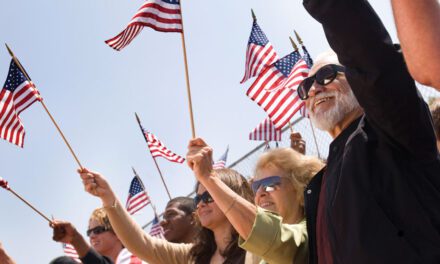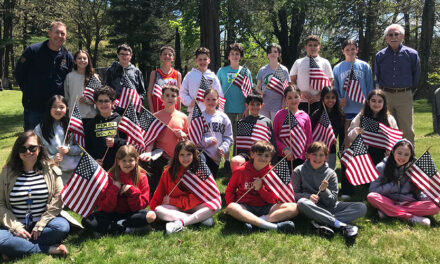Published in the November 2, 2016 edition
By DAN TOMASELLO
LYNNFIELD — Residents have no reason to doubt the outcome of the town’s Presidential Election results, Town Clerk Trudy Reid said last week.
Republican candidate Donald Trump has repeatedly claimed the election is “rigged,” telling his supportors to watch out for large–scale voter fraud — despite a lack of evidence that it exists.
In an interview with the Villager last week, Reid said local residents shouldn’t have any fears about a compromised election when casting their ballots on Nov. 8.
“It’s a non-issue in Lynnfield,” said Reid. “If people don’t return their census, they are marked as inactive on the voters’ list and they have to show an ID to prove they still live in town. We check death certificates regularly and if there is a dead person still on the voters’ list, we delete them.”
Trump has also called on his supporters to watch the polls closely to see if voter fraud takes place. Reid said last week she has not received any word of Trump’s campaign requesting observers.
“If there are any observers, it would be a common courtesy to let town and city clerks know ahead of time,” said Reid.
Reid also said the town does not have to provide tables or chairs to election observers on election day but said the town could accommodate observers if given proper notice and there are enough tables and chairs available. She said election observers are not allowed to use town resources as well. For example, she said if an election observer is using a laptop and the battery dies, the observer will not be able to plug it into an outlet and use town–supplied electricity.
While there have been isolated cases of voter fraud in the U.S., there is no evidence of it being a widespread problem. In one study, a Loyola Law School professor found 31 instances involving allegations of voter impersonation out of 1 billion votes cast in U.S. elections between 2000 and 2014.
Over the course of the past few weeks, Trump has specifically raised concerns about people fraudulently voting by using the names of dead people. He cited research showing 1.8 million deceased people are still listed on state voter rolls, figures which were verified in a 2012 Pew report.
When asked directly at the final presidential debate if he would accept the election results, Trump refused, saying: “I will keep you in suspense.”
The Pew Center on the States issued a report in 2012 saying the nation’s voter registration system was “plagued with errors and inefficiencies that waste taxpayer dollars, undermine voter confidence and fuel partisan disputes over the integrity of our elections.” The report urged states to expand online voter registration and other online tools to allow voters to update their information, saying paper-based systems presented several opportunities for errors.
According to The Associated Press, Trump correctly cited Pew’s findings in that report, which found that approximately 24 million, or one of every eight, voter registrations were no longer valid or significantly inaccurate, and that more than 1.8 million deceased individuals were listed as voters. He also was correct in noting that approximately 2.7 million people have registrations in more than one state.
However, a majority of states have taken action in recent years to address concerns raised in the Pew report. The Pew report does not say that any of the inaccuracies led to a system that is vulnerable to widespread voter fraud.
In an update posted on its website recently, the Pew Center said election officials have worked to upgrade their voter registration systems.
The organization noted that 40 states now provide or have passed legislation allowing for online voter registration and 20 states have signed up for the Electronic Registration Information Center. That system is administered by the states and alerts election officials to cases in which a voter’s information may be out of date.
The system has contacted more than 4.5 million people who had moved but not updated their voter registration information, according to Pew.
Ohio is among the states that participate in the program. Ohio Secretary of State Jon Husted, a Republican, has said voter fraud is rare and has pushed back against Trump’s claims the election could be compromised. An estimated 515,000 deceased voters have been removed from Ohio’s registration records since Husted took office in 2011.
There have been isolated cases in which ballots have been cast in the name of a deceased individual, including two instances in 2012 in Husted’s Ohio.
In one case, a 54-year-old nun pleaded guilty to a charge of illegal voting after acknowledging she filled out an absentee ballot on behalf of a fellow nun who had recently died. The other involved allegations that a 75-year-old man had cast an absentee ballot on behalf of his recently deceased wife.
Experts say cases of voter fraud involving dead people are isolated. They also say it would be an inefficient way to rig a presidential election, given that the fraud would have to be conducted one voter at a time and would be effective only in places where the race is close enough that the outcome could be swayed.
There are more than 9,000 election jurisdictions nationwide and hundreds of thousands of polling places.
“Although entertaining, every time there are claims of hordes of dead people voting, those claims are debunked upon closer scrutiny,” said Wendy Weiser, head of the democracy program at the Brennan Center for Justice at NYU’s School of Law. “There has been no incident in recent memory in which people were able to impact an election by mobilizing fraudsters to impersonate dead people at the polls.”
Weiser said a more pressing concern is that living people are sometimes mistakenly identified as dead and removed from a state’s voter registration database, posing a challenge to them voting legally on Election Day.
— The Associated Press contributed to this report.




